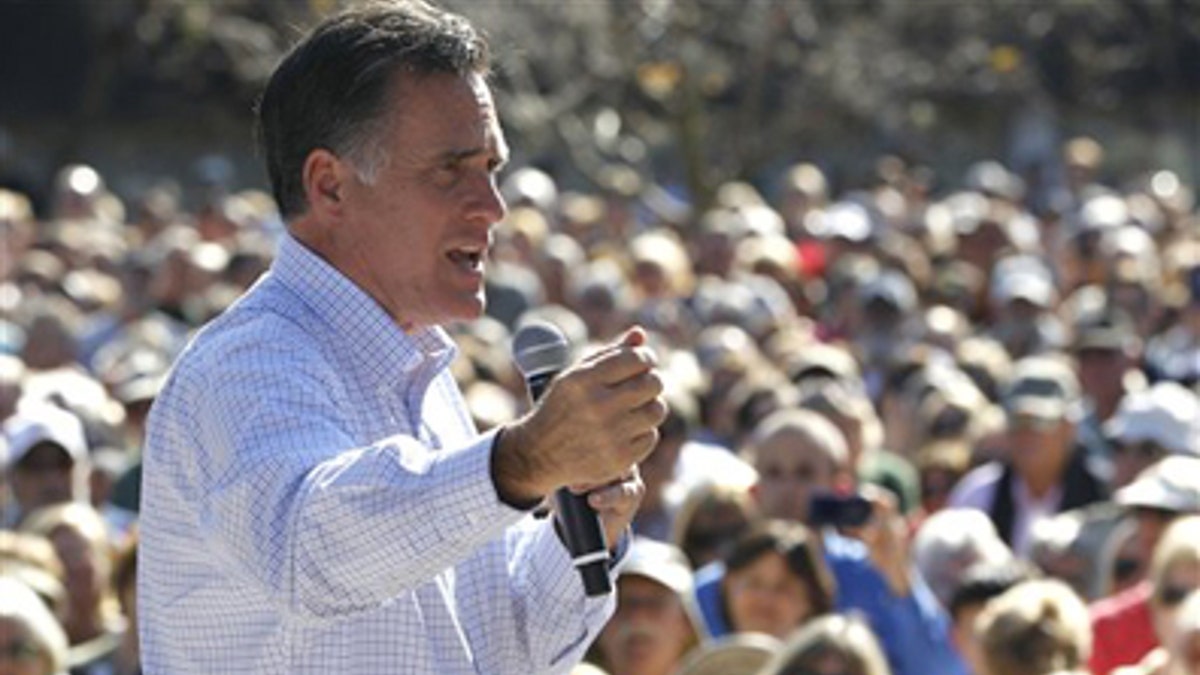
Jan. 30, 2012: Republican presidential candidate, former Massachusetts Gov. Mitt Romney campaigns at Pioneer Park in Dunedin, Fla. ((AP Photo/Charles Dharapak))
Mitt Romney may be consolidating his lead over Rick Santorum in the race to secure the GOP nomination picking up an endorsement from Marco Rubio on Wednesday night and from members of the Bush family. But the Republican presidential hopeful is facing a new and potentially very serious crisis in his campaign.
The former Massachusetts governor's most serious problem going forward-- one that the Wall Street Journal called attention to in early March -- is that his negative rating exceeds his positive rating by double digits.
In the recently released nationwide ABC News/Washington Post poll a mere 34 percent of Americans say they have a favorable opinion of Mr. Romney-- a record low for any leading presidential candidate in a primary season in an ABC News/Washington Post survey data since 1984.
Meanwhile half of voters (50%) say they have an unfavorable impression of the former governor.
In most elections that I have been involved with, it certainly is the case that candidates whose negative ratings are over 50% tend to lose.
Put bluntly, it is very difficult, if not impossible, for a presidential candidate to win an election with an overall negative rating of 50% when facing an incumbent whose favorability is above fifty percent. And President Obama’s favorability rating in the Washington Post/ABC News Poll is almost as high as President Bill Clinton’s 56 percent favorability in June 1996.
Moreover, new state data out from Quinnipiac shows President Obama leading former Governor Romney by 7 points in Florida, 6 points in Ohio, and 3 points in Pennsylvania-- all suggesting that key swing states have moved in the direction of the incumbent president.
Earlier data last week from Virginia and Florida collected by Scott Rasmussen echoed these results, showing a lead for President Obama holding a lead outside the margin of error.
The implications for Governor Romney are clear.
If Mitt Romney hopes to defeat President Obama in the November general election, he will need to offer a bold and decisive message, agenda and vision and begin making a positive case for his candidacy.
What is unclear, is whether he will have the money – vis-à-vis either his campaign or his Super PAC, "Restore Our Future" – to do what is necessary, given his continued primary fight with Rick Santorum, and to a lesser extent a scaled back Newt Gingrich.
In the 1996 presidential campaign, when I was working for President Bill Clinton, we were able to make Bob Dole unpalatable by linking him continually to former House Speaker Newt Gingrich.
Right now, former Governor Romney is at least as unpalatable to voters as former Majority leader Dole was back in 1996.
With the Obama campaign poised and ready to turn its full attention to further undermining Mitt Romney’s credibility the second the president receives the official nomination, it is certain that if he is unable to address his negatives by providing a voters with a clear and compelling reason to vote for him, the presidential election could widen, and become much more difficult in ways than now are hard to fully appreciate.
Douglas E. Schoen is a political strategist and Fox News contributor. Schoen, who served as a pollster for President Bill Clinton, is author of several books including the forthcoming "Hopelessly Divided: The New Crisis in American Politics and What It Means for 2012 and Beyond" (Rowman and Littlefield).
